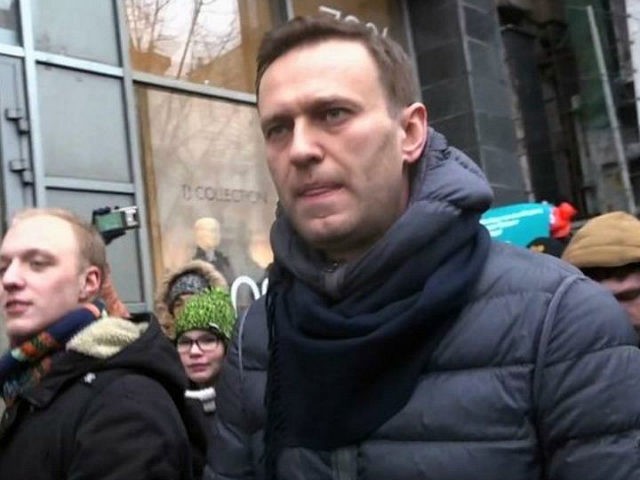Kremlin spokesman Dmitry Peskov claimed Tuesday’s phone call between President Joe Biden and his Russian counterpart Vladimir Putin was “businesslike” and Biden did not use the opportunity to raise the issue of political prisoner Alexei Navalny, imprisoned after accusing Putin of an assassination attempt.
The White House claimed in its readout of the call – Biden’s second with the Russian strongman since his inauguration – that Biden expressed “concerns” over Putin’s sudden, rapid buildup of military equipment on the border with Ukraine, which followed that nation’s president, Volodymyr Zelensky, signing an executive decree putting into motion a plan to liberate Ukrainian Crimea from Russian colonization.
The White House also claimed the two leaders discussed negotiations regarding the START nuclear arms agreement, which Biden abruptly agreed to extend for five years despite the Russians only asking for a one-year extension. Under President Donald Trump, the United States refused to extend the agreement without expanding it to other world nuclear powers like China.
“It was businesslike,” Peskov, the Putin spokesman, told reporters on Wednesday about the nature of the call. He described it as “long enough” given the range of topics discussed, including a potential in-person meeting between Biden and Putin.
“Putin explained Russia’s approaches to the political settlement in Ukraine, based on the Minsk Accords. The two leaders agreed to issue instructions to the Russian and US agencies concerned to work on the questions raised during the conversation,” Russian news agency Tass relayed.
Peskov plainly stated the two leaders did not discuss Alexei Navalny.
Navalny, a longtime opposition leader, fell ill while on a trip to Siberia last year. His team flew him out of Russia to Germany for treatment, where doctors stated he showed signs of poisoning with Novichok, a chemical weapon believed to be exclusively used by the Russian state. Putin’s regime denied any involvement, blamed Germany for poisoning Navalny, and arrested him for violating parole upon his return to Russia following medical treatment.
Navalny began a hunger strike in late March to protest prison guards’ refusal to offering him medical care, which his family alleged has led to a deteriorated state.
“He is just as cheerful and fun. But he speaks with difficulty and from time to time hangs up and lies down on the table to rest,” wife Yulia Navalnaya said following a visit to the prison on Tuesday. “I know that he is not going to give up… But after the visit with Aleksei, I worry about him even more.”
Navalnaya claimed Navalny lost nearly 40 pounds in prison.
The White House readout of Biden’s call with Putin did not note any reference to the alleged human rights abuses Putin’s regime is perpetrating against Navalny.
“President Joseph R. Biden, Jr. spoke today with President Vladimir Putin of Russia,” the White House statement read. “They discussed a number of regional and global issues, including the intent of the United States and Russia to pursue a strategic stability dialogue on a range of arms control and emerging security issues, building on the extension of the New START Treaty.”
The statement claimed Biden mentioned alleged Russian interference in American elections and “emphasized the United States’ unwavering commitment to Ukraine’s sovereignty and territorial integrity.”
“The President voiced our concerns over the sudden Russian military build-up in occupied Crimea and on Ukraine’s borders, and called on Russia to de-escalate tensions,” it alleged.
It concluded by stating Biden sought “a summit meeting in a third country in the coming months to discuss the full range of issues facing the United States and Russia.”
The official statement from the Kremlin also noted, “the U.S. president proposed considering the possibility of holding a personal meeting on the highest level in the foreseeable future.”
Putin and Biden will already “meet for a Climate summit” next week held virtually.
Putin invited Biden to converse in what he described as a “debate” broadcast internationally live in March. This was his second response to Biden agreeing with an interviewer that Putin was a “killer.” Putin’s first response was simply, “I wish him good health.”
In addition to the accusations of human rights violations against Navalny, Biden’s call with Putin followed weeks of an increasingly menacing military buildup on Russia’s border with Ukraine. On the opposite border from where Putin has moved heavy artillery and troops, Ukraine has endured a civil war since 2014 between Kyiv and two self-proclaimed “republics” in Donetsk and Luhansk, collectively known as the Donbass region. Zelensky visited Donbass last week following the killing of another Ukrainian soldier on the front lines. Kyiv has protested the extensive evidence of Russian support for the violent separatists for years.
Biden made his first call to Putin on January 26, less than a week after being inaugurated president. In contrast, Biden waited 72 days before communicating directly with Zelensky, despite Ukraine being a traditional U.S. ally.

COMMENTS
Please let us know if you're having issues with commenting.